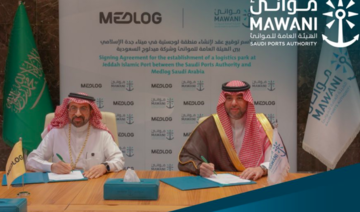CAIRO: Saudi Arabia’s logistics sector has spawned a new breed of entrepreneurial talent aiming to utilize the most recent technological trends to boost the economic pillar.
The Kingdom’s last-mile deliveries have been encountering delays and inefficiencies due to slow technology adoption, which has called for new innovations in the sector.
According to a report by global logistics leader Maersk, the lack of digital advancements in local delivery networks hampers shipment tracking and visibility.
Additionally, consumer preference for cash on delivery, empty miles, and sudden demand spikes pose financial challenges for last-mile logistics.
These challenges have spurred the emergence of PIESHIP and its commitment to bolstering the sector through digital solutions.
Founded in 2023 by Nasser Al-Harthi, Musaed Al-Amri, and Mohammed Mohsen, PIESHIP utilizes artificial intelligence and crowdsourcing to optimize delivery routes and schedules, reduce costs, and enhance customer experience.
The company offers its clients warehouse management solutions, utilizes an app for delivering shipments, and provides technical solutions for logistics services.
“By doing so, PIESHIP aims to make last-mile delivery more efficient and reliable, benefiting both companies and their customers,” Al-Harthi, the CEO, told Arab News in an interview.
PIESHIP is setting its sights on becoming a leader in last-mile delivery services, aligning closely with the fast-paced global shifts toward more efficient, reliable, and cost-effective logistics solutions.
“Our aim is to become a leading provider of last-mile delivery services,” the CEO articulated, emphasizing the company’s commitment to technological innovation and customer satisfaction to navigate the future logistics landscape.
Continuous innovation
To maintain its competitive edge, PIESHIP is focusing on continuous innovation, “by investing in research and development, collaborating with industry partners, and staying abreast of the latest logistics trends and technologies,” according to Al-Harthi.
The company is particularly excited about the potential of advanced analytics and machine learning to refine delivery processes and enhance efficiency, he added.
In light of its recent seed funding round, PIESHIP is channeling resources into expanding its technological backbone, team capabilities, and research efforts.
“These investments are crucial for improving our service offerings and operational efficiency,” Al-Harthi said.

E-commerce expansion, technology adoption, sustainability, and enhancing customer experiences are pivotal trends that resonate with Vision 2030’s goals.
Nasser Al-Harthi, PIESHIP CEO
He further highlighted the company’s commitment to leveraging these assets to bolster its market presence in Saudi Arabia and potentially beyond.
A shared vision
Regarding the future of logistics in Saudi Arabia, the CEO sees a direct connection between industry trends and the nation’s Vision 2030 objectives.
The economic diversification plan is focused on making the Kingdom a worldwide logistics hub.
The government’s National Transport and Logistics Strategy aims to double the sector’s contribution to gross domestic product, making the Kingdom one of the top 10 countries in the Logistics Performance Index.
A two-day conference held in Riyadh in October saw 52 agreements signed to strengthen the Kingdom’s supply chain and logistics sector, underlining its growth. “E-commerce expansion, technology adoption, sustainability, and enhancing customer experiences are pivotal trends that resonate with Vision 2030’s goals,” Al-Harthi said.
The rise of e-commerce is particularly significant, with efficient logistics services like those PIESHIP offers being vital to support this sector’s growth, ultimately aiding in the country’s economic diversification and innovation drive, added the CEO.
With the Kingdom’s Vision 2030 spotlighting innovation, PIESHIP’s technology-centric model is well-aligned for future scalability and market leadership.
“Our approach, particularly our investment in AI and crowdsourcing, is pivotal in optimizing logistics operations, which will continue to propel our growth in the Saudi market,” Al-Harthi stated.
On the technology front, PIESHIP leverages real-time tracking and delivery notifications to enhance customer engagement and satisfaction.
“Our AI-driven algorithms play a crucial role in navigating delivery hurdles, ensuring timely and accurate deliveries, and offering our users an unprecedented level of transparency and control over their shipments,” explained the CEO.
PIESHIP is positioning itself within Saudi Arabia’s competitive landscape by focusing on efficient and reliable last-mile delivery services.
“PIESHIP differentiates itself from traditional logistics companies by offering a more flexible and cost-effective solution tailored to modern businesses’ needs,” Al-Harthi explained.
With a keen eye on the last-mile delivery segment, PIESHIP aims to address the complexities and high costs associated with this crucial phase of the logistics process.
Collaboration with governmental and regulatory bodies is a key component of PIESHIP’s strategy to enhance its service offerings and expand its reach within the Kingdom.
The CEO said: “PIESHIP works closely with local transportation authorities to comply with all relevant regulations and licensing requirements.”
Beyond compliance, PIESHIP seeks to forge partnerships that extend its service range, notably with e-commerce platforms like Salla and Zid, to provide integrated delivery solutions to their merchants.
In response to the evolving logistics market, PIESHIP is committed to continuous innovation to meet the changing demands of businesses in Saudi Arabia and potentially new markets.
“The company plans to invest in new technologies and strategies that can help it improve its operational efficiency, expand its reach, and enhance the customer experience,” Al-Harthi stated.
Looking ahead, PIESHIP is exploring opportunities to extend its services beyond Saudi Arabia, targeting markets with similar logistics landscapes and a strong e-commerce presence.
While the immediate focus remains on solidifying its position in the Saudi market, Al-Harthi acknowledges the potential for international expansion.
“Future expansions into markets with similar logistics challenges and opportunities are considered,” he noted, highlighting the importance of a robust e-commerce sector and favorable regulatory environment in selecting target markets for PIESHIP’s growth.























